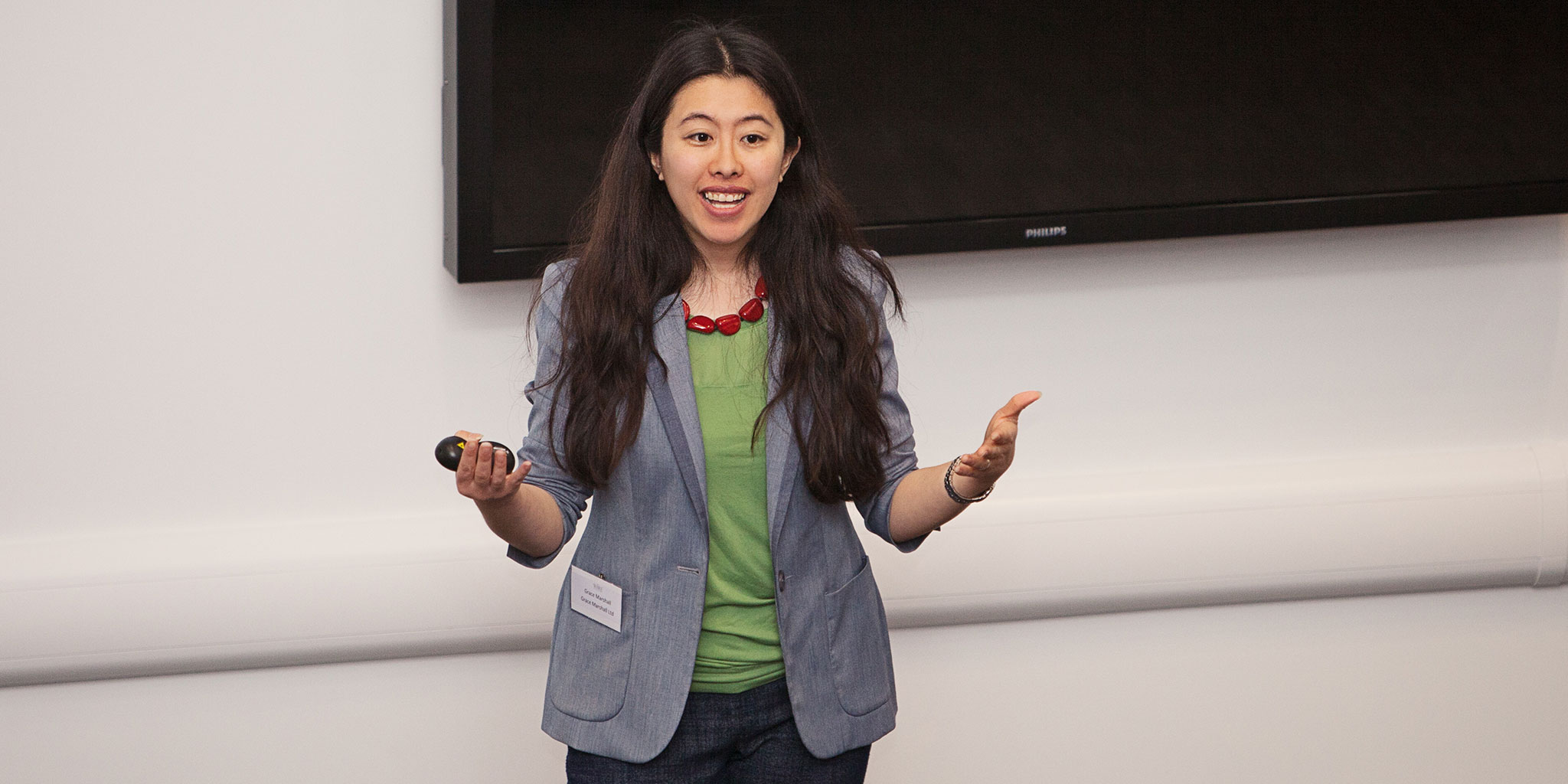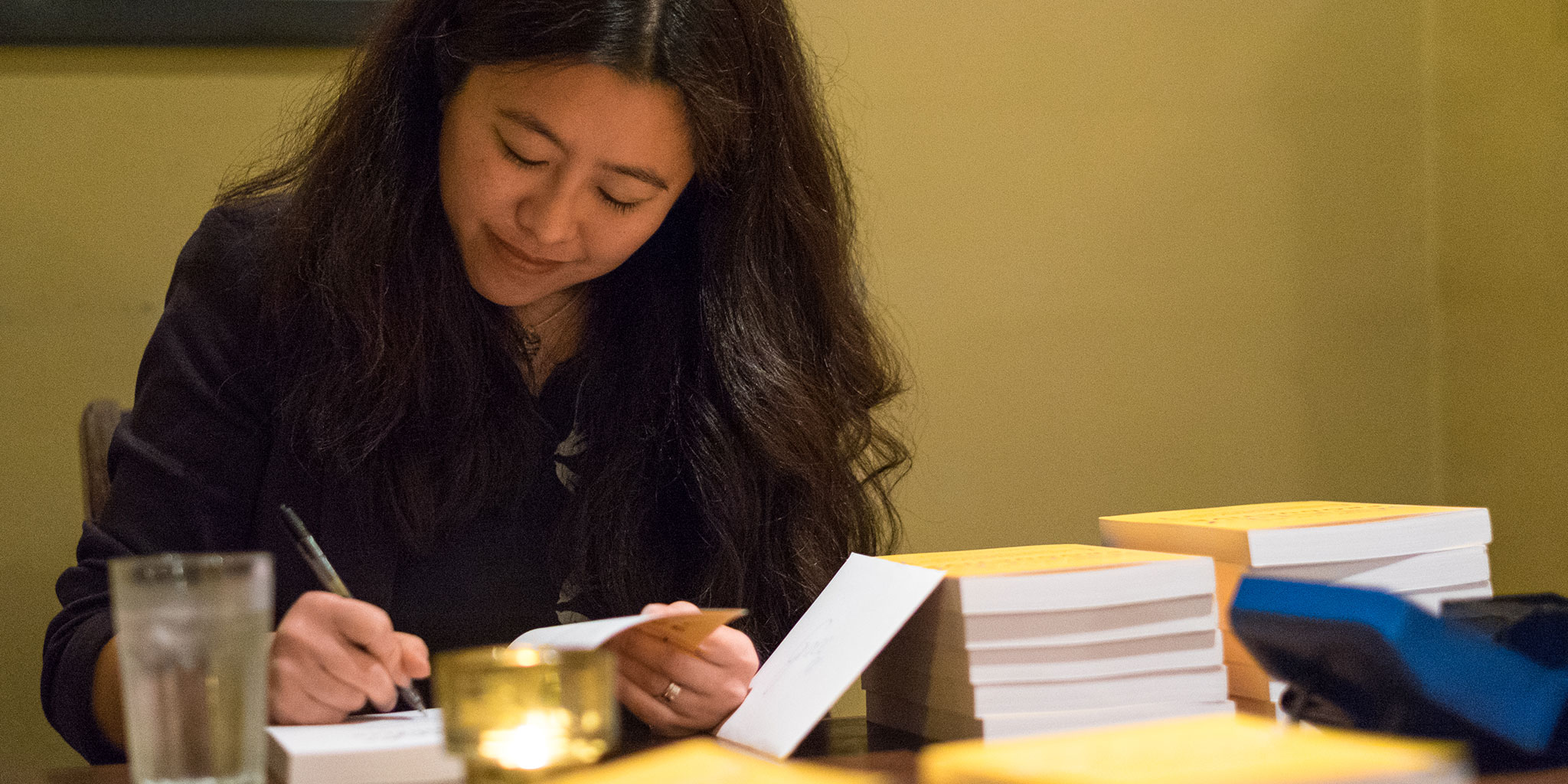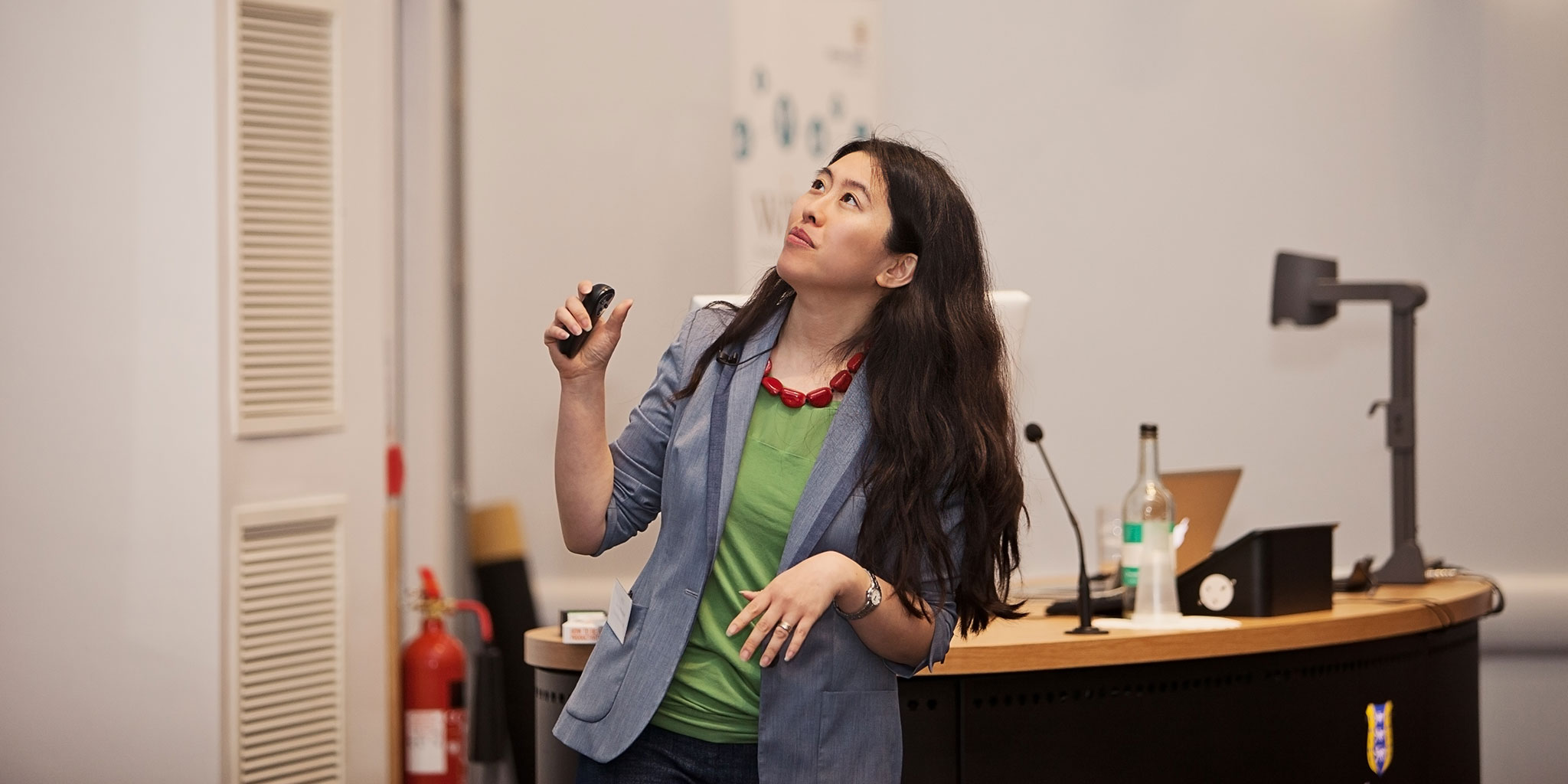Interview with Grace Marshall
Michael Sliwinski: Please introduce yourself to our readers.
Grace Marshall: My name’s Grace Marshall. I am head coach and chief encourager at grace-marshall.com. And I’m also a productivity ninja with the team at Think Productive, as well.
Michael: You’re also an author.
Grace: That’s right. In 2012 I published a book called “21 Ways to Manage the Stuff that Sucks up Your Time.” And then, I’m hot off the press now – my new book is called “How to Be Really Productive.”
Michael: Congratulations!
Grace: And it’s about achieving clarity and getting results in a world where work never ends.
Michael: You wrote a very good article in Productive! Magazine about a work-life balance. I heard that we should read the word “balance” not as a noun but actually as a verb. There is no sense in achieving balance. We should keep balancing. It’s a balancing act, right?
Grace: Absolutely. I’ve got two kids. My son is ten and my daughter is six. And a little while ago we were just packing up. My son spotted his dad’s motorbike and went: “How do you stay balanced on the bike?” And then we realized that actually it’s really hard to stay balanced on a bike when it’s just stationary. It’s actually easier as you’re moving.
And work-life balance is something that I’ve found, if you treat it like a balancing scales, like an accounting act, it’s really hard, because as soon as you start focusing on one side, and do more here, you then have to balance the other side. So you’re always constantly moving between. You’re constantly focusing on the thing that you’re not supposed to be focusing on.
Michael: And so you’re getting distracted…
Grace: Exactly. What I’ve found much more helpful is to talk about balance in terms of, okay, it’s an adjusting thing. And so, one of the terms I even use is “work-life rhythm.”
Michael: It sounds much better than balance indeed.
Grace: It’s a rhythm in that there are some things that go faster and sometimes life goes slower. And both of those things are good. It’s not about making everything equal. It’s about making life meaningful and enjoying the slow times and the fast times. Enjoying it when it’s full on and crazy and busy, but also enjoying it when it’s calm as well. So having variety and richness in life rather than having everything equal and in boxes.
Michael: Actually, it’s a perfect segue to talk about guilt. When you think you are not doing enough in one of your life’s areas you start to feel guilty. And, because you always want be in this equilibrium, you start to work harder in this field but then you neglect another one.
Grace: Yeah, guilt’s a funny thing. Once you notice it, you can start to go “hang on a minute… this isn’t working.” Because guilt distracts you. It distracts from the thing you’re supposed to be focused on. But guilt also holds you back. So, if I feel guilty about not spending enough times with my kids, for example, that’s going to take up energy. But it also is going to make me hold back from maybe pushing forward in my business, my career. Or maybe it might stop me from taking some time out for myself. And, the funny thing is, if I take some time out for myself, that might actually give me what I need to be a better mum or to be a better wife.
And so guilt has you kind of thinking that every time you move forward, you’re moving backwards somewhere else. And so, I think when you’re dealing with guilt, when you realize that it’s not helping you, one of the first things to do is to actually take a step back and go, “Okay, let’s start with… Let’s start with enough.”
Michael: Because guilt always tells you that you’re not doing enough…
Grace: There’s not enough time… All that kind of stuff. Whereas, you know, actually, when you stop with enough, you go, “Okay. If what I have today is one hour, what do I want to do with that one hour?” And it means that you can start to kind of focus on where you want to put your energy, where you want to be productive, rather than being like: “Ah, it’s not enough here, it’s not enough there, and I’m constantly spinning round in circles.”

Michael: I think there was a very good example in your article in Productive! Magazine: you wrote that one Sunday you had to travel to a workshop that you had to run on Monday. And instead of feeling guilty that you wouldn’t be able to spend a Sunday with your family, you just spent a very lazy morning with your family to make sure that you made up in quality of the time you spend with them, right?
Grace: Yeah. Absolutely. So we went for pancakes. We had pancake breakfast. ;-)
Michael: I couldn’t imagine something better. :-)
I also have another ideas of how to get rid of guilt. As I’m a CEO of Nozbe, but then I am also the editor of Productive! Magazine, and then I’m a blogger, and I am still the VP of marketing in our company I have to balance really well to be able to dedicate some time to each of these things. So what I do is dedicate various days of the week to different purposes. And so Tuesday is a marketing day – I don’t feel guilty about not doing anything else. I know that Tuesday is a time to focus on marketing. Everything else must go to a different day. And you? How do you manage your time?
Grace: I would say I wish I was as disciplined as you. :-) Seriously though, rather than have a particular day for a particular thing, I tend to kind of look ahead. So I do my weekly review. I scope ahead and I have a look and see, what’s the rhythm like. So, if I know I’ve got several workshops, where am I going to put in those pockets of rest? And, in fact, my husband and I, we do this thing, usually on a weekly basis: when’s our next date night?
Michael: Rational romanticism. :-)
Grace: Otherwise, you can go months and it doesn’t happen. It is also important to plan some time for a recharge. My husband is an introvert, so he needs time to himself to recharge, whereas I’m an extrovert, so I can recharge around people. So one of his questions is: when’s my next cave time? When he can have time to himself and recharge. And I think that a part of the equation is recognizing that recharging and spending quality time with the people that you love are the real things that fuel your productivity. It’s not something that takes away from your productivity. It’s not something that’s a luxury. It’s actually what helps you to be at your best and, therefore, you can give your best to whatever you’re doing.
Michael: I learned the idea of date night with your spouse from Laura Stack. When she told me that, I realized: yeah, when was my last date with my wife? So now we plan our dates and, although it might feel not spontaneous at all, it actually can be really good quality time together! So this is really important. And when do you do your weekly review, Grace? And how do you do it?
Grace: I try to do one on a Monday. But occasionally I get booked for workshops on a Monday, so then I’ll leave it. But what I tend to do is, after each weekly review, I check: when’s my next weekly review? So, if I am busy next Monday, I schedule it for a different day in advance. I also do a kind of mini-review with my husband; usually we try and do it on a Saturday morning.
Michael: Cool. How does it work?
Grace: Well, we’re still working on it, but we’re trying to make it less like a meeting :-) and more like a kind of getting together – a conversation with a cup of tea. Also, when we first started doing it, I would be sat here on this side of the table, he’d be sat on the opposite side. We’d both have our laptops open, and it was really formal. What we found is, actually, if we just sit side by side, we can look at the same screen. Even just that act of sitting side by side felt more like, okay, we’re working on this together, rather than like negotiating with each other.
Michael: Now it looks more humane. When I think of you just sitting in front of your own laptop screen each… It created a natural barrier!
Grace: Absolutely. I think it was Brené Brown who said that feedback is sitting on the same side of the table looking at the problem together rather than, you know, kind of being opposite each other.

Michael: Great point. Now, tell us, how do you deal with, you know, being a trainer. It must be a bit stressful to go, you know, do these workshops with different people, different groups, every time you need to prepare for the unknown. How do you deal with stress in general?
Grace: One of the things is about being aware what stresses you out. I love meeting the people and doing the workshop. That’s great. What takes up more energy for me is if I have to design something new. Let’s say they want this workshop and not that one. And slightly different. And so then that takes up a lot of head space. I’ve got to figure out how to do that.
Running workshops might also get stressful when you can’t plan it all really rigorously. Another thing is that when you’re running workshops you’ve got to travel here, travel there. I’ve noticed that I need a lot of time to recover after doing lots of travel. I’ve figured out that this week in about 60 hours I had been in 12 different train stations, running three different workshops in three different places. Now, I can’t do that on a regular basis. I can’t do that every day.
Michael: Nobody can…
Grace: For a short burst, I can do that as long as I make sure I’ve got time before hand to recharge and time afterwards to recharge. Then I’m okay.
Michael: We tend to think that we can perform at our best all the time. And we cannot. We do need the time to recharge. And people forget about it.
Grace: We definitely need time to recharge. And so I sometimes try to plan in little moments of recharging. So, if a workshop starts really early in the morning, I’ll try and get there the night before, so I can get there, have a meal, sleep properly, and then do the workshop. Because I’m better when I’ve had some sleep. Whereas if I’m going in the morning and I’m worrying about whether the train gets delayed and I end up having to rush, or I’m getting up at five o'clock in the morning, by the time we’re halfway through the workshop, I’m running the risk of being too tired.
Michael: I think people also forget that, to be productive, we also need to treat ourselves from time to time. Have this moments of fun. It’s not all just about serious business and serious productivity.
Grace: Right, sometimes fun can unleash our productivity. Take procrastination, for example. When we take ourselves too seriously, we’re much more likely to procrastinate. Things are too serious, the stakes are too high. What if I get it wrong? All that kind of stuff. And then our lizard brain comes into play and there’s also like, okay, I think I’m going to go check my e-mails instead.
Michael: Exactly.
Grace: When we make things fun, I think our productivity flows a lot easier, and suddenly we’re not stopping ourselves, and we’re not getting in the way. We think: let’s play with this and let’s play with that. Let’s see if getting it perfect feels too big, let’s see if I can just tweak a little bit here or try a little thing there. That way we can almost go round and divert our resistance. And it means we can actually do our best work without having to strap ourselves to the chair and flog ourselves harder.

Michael: I love Seth Godin’s presentation about the lizard brain. It puts your mind in perspective to how we really work, and then when you think about it, we do function like that. :-) Grace, let’s get back to your new book: “How to be Really Productive.” Why should we read it?
Grace: I know that there are lots of books around organization, productivity and systems. And there’s some great stuff around that. But what I realized is actually being productive is more than just being organized.
First of all, you’ve got to be focusing your efforts on the right things. It has to be meaningful. If you’re just ticking things off a to-do list and it doesn’t feel meaningful, then you’re not going to feel productive. It has to be enjoyable as well. So it’s about kind of defining success on your own terms.
The book is about some very practical things around… One chapter’s called “Mind Monkey and Lizard Brain.” I write about understanding how those mind monkeys work, and maybe rather than trying to wrestle with them, it’s about: “Okay, how do I play around them? How does my thinking affect the way that I work?” There are also some things that I suppose come up a lot in the workshops that I run, but people don’t write about so much: the things like personality and the way it affects productivity.
Michael: Interesting!
Grace: I also try to answer the question: how I work with other people – these are like real world tactics. If I’m really organized, that’s great, but what about when my boss comes in and dumps on me? This is a section about managing up. And I actually wrote in there something like: what if your boss is either an over-enthusiastic Tigger or a seagull manager (someone who flies in, kind of dumps on you, and then flies out :-D)?
Michael: Awesome comparison!
Grace: Those are the conversations I have with clients and people in my workshops: OK, that sounds great in theory, but how do I deal with this? How do I deal with the kind of real world tactics? And then, there’s a whole piece about work and life and juggling and the guilt thing we discussed. I wanted to write something around that, because there hasn’t been thoo much written about that.
Michael: And the title itself?
Grace: “How to Be Really Productive” is actually, what does it really mean. It’s a broader conversation. It’s about how we live, how we think, how we work with other people, as well as how we organize our to-do lists.
Michael: I also realized that when we talk about productivity, people think that we want in-charge people to be like these hamsters, just going and going. And it’s not about that, right?
Grace: No, exactly. In fact, it’s about how to stop going fast on the hamster wheel. There’s a chapter in there called “Fake Work vs. Real Work.”
Michael: This is an important issue – being busy vs. being productive.
Grace: Right. Fake work is this stuff that just keeps you busy, that keeps you going on the hamster wheel. Whereas real work sometimes doesn’t even look like real work. Sometimes it might be stopping and taking a step back and thinking about what I really need to focus on here. And that can be the real work. It might feel like a luxury, or it might feel like I’m being lazy and I’m not working, but actually it helps us to focus our energies on the things that matter to us. That’s what real productivity is about.
Watch the video interview with Grace:

